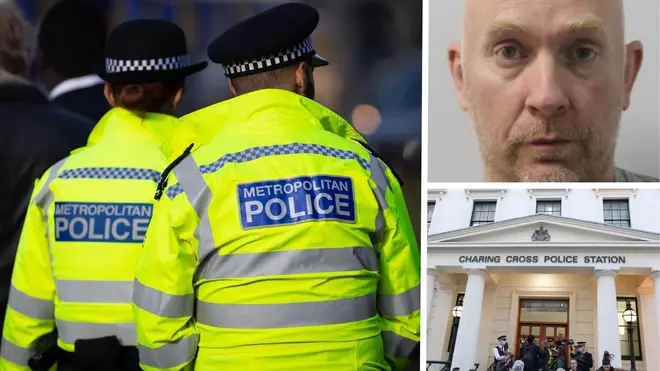
Dean Dunham 9pm - 10pm
17 February 2022, 07:51 | Updated: 17 February 2022, 08:11

The number of times the Met Police has referred itself to the Independent Office for Police Conduct has fallen by half in three years, LBC can reveal.
The London Assembly Labour Party say it raises questions about the effectiveness of police disciplinary procedures.
Referrals to the IOPC must be made in a variety of circumstances, such as when complaints or police conduct relate to sexual offences, or where a potential criminal offence has been committed. There is also a requirement to refer any matter that has led to a death or serious injury.
The data, released via a series of written questions to the Mayor of London, shows that the number of referrals decreased from 765 in 2017 to just 352 in 2020.
Data on the internal use of the Met’s whistleblower hotline shows it has fallen by nearly a quarter over the same period.
It comes after a swathe of scandals hit the force, including the tragic murder of Sarah Everard by serving police officer Wayne Couzens, and the racism scandal which was uncovered at Charing Cross station.
Read more: Sadiq Khan puts Cressida Dick 'on notice' after Met cops' rape jokes exposed by report

LBC Correspondent updates on IOPC Charing Cross report
Labour's Unmesh Desai, who sits on the London Assembly's Police and Crime Committee, said: "We know there's a toxic culture in some parts of the Met, so it would be reasonable to question why there has been a decline in the number of investigations being conducted and dismissals being made.
"There's a big problem with the relatively small numbers of officers disciplined or dismissed. And that is why it's so important that the new Commissioner must urgently look at ways of tackling disciplinary and whistleblowing procedures so the thousands of dedicated officers in the Met can report misconduct confidently and securely."
The data also shows that between 2017 and 2020, over just 9% of referrals led to an officer being sanctioned, in the form of a written warning, final written warning, reduction in rank or dismissal without notice.
But an IOPC source argued that it is not fair to criticise the low numbers of sanctions. Some referrals, such as in cases where death or injury has occurred, may not have involved police misconduct of any kind. Thus, the source said, it might not be surprising that a low proportion result in disciplinary action.
The IOPC said in a statement that: "Comparing disciplinary outcomes from the total number of referrals does not provide an accurate picture. Only a proportion of referrals are independently investigated by us and only a proportion of those that we do investigate involve conduct issues. For instance, last year (1 April 2020 - 31 March 2021) of 460 completed IOPC investigations only 35 per cent (159) involved conduct matters."
The details of misconduct hearings are routinely made available on the Met Police website. But they are deleted after an unspecified period, so it is impossible to search for specifics of historic cases. However, the IOPC website does still have a number of cases listed, that LBC was able to analyse.

Wayne Couzens to die behind bars
In 2017, for example, there was the case of an officer who had a relationship with a victim of domestic abuse. It was decided that the officer needed reminding of the policies and guidance in terms of relationships with people they meet through work, but no disciplinary action was taken.
Or the case of an officer who allegedly put racist posts on Facebook. The officer denied posting them, saying they could have been posted by their partner or a relative. The IOPC found that there could be a case to answer for gross misconduct, but a subsequent disciplinary panel found no case to answer.
Disciplinary procedures themselves are also independent of either the IOPC or individual police forces. Since 2015, they have been lead by independent Legally Qualified Chairs (LQCs). LBC has previously heard concerns that chief constables are frustrated with the new system, which they say has made it harder to take action against officers who step out of line.
The Metropolitan Police was approached for comment.